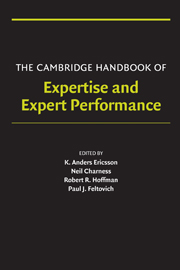Book contents
- Frontmatter
- Contents
- Acknowledgments
- Contributors
- PART I INTRODUCTION AND PERSPECTIVE
- PART II OVERVIEW OF APPROACHES TO THE STUDY OF EXPERTISE – BRIEF HISTORICAL ACCOUNTS OF THEORIES AND METHODS
- PART III METHODS FOR STUDYING THE STRUCTURE OF EXPERTISE
- 8 Observation of Work Practices in Natural Settings
- 9 Methods for Studying the Structure of Expertise: Psychometric Approaches
- 10 Laboratory Methods for Assessing Experts' and Novices' Knowledge
- 11 Task Analysis
- 12 Eliciting and Representing the Knowledge of Experts
- 13 Protocol Analysis and Expert Thought: Concurrent Verbalizations of Thinking during Experts' Performance on Representative Tasks
- 14 Simulation for Performance and Training
- PART IV METHODS FOR STUDYING THE ACQUISITION AND MAINTENANCE OF EXPERTISE
- PART V DOMAINS OF EXPERTISE
- PART VI GENERALIZABLE MECHANISMS MEDIATING EXPERTISE AND GENERAL ISSUES
- Author Index
- Subject Index
- References
14 - Simulation for Performance and Training
from PART III - METHODS FOR STUDYING THE STRUCTURE OF EXPERTISE
- Frontmatter
- Contents
- Acknowledgments
- Contributors
- PART I INTRODUCTION AND PERSPECTIVE
- PART II OVERVIEW OF APPROACHES TO THE STUDY OF EXPERTISE – BRIEF HISTORICAL ACCOUNTS OF THEORIES AND METHODS
- PART III METHODS FOR STUDYING THE STRUCTURE OF EXPERTISE
- 8 Observation of Work Practices in Natural Settings
- 9 Methods for Studying the Structure of Expertise: Psychometric Approaches
- 10 Laboratory Methods for Assessing Experts' and Novices' Knowledge
- 11 Task Analysis
- 12 Eliciting and Representing the Knowledge of Experts
- 13 Protocol Analysis and Expert Thought: Concurrent Verbalizations of Thinking during Experts' Performance on Representative Tasks
- 14 Simulation for Performance and Training
- PART IV METHODS FOR STUDYING THE ACQUISITION AND MAINTENANCE OF EXPERTISE
- PART V DOMAINS OF EXPERTISE
- PART VI GENERALIZABLE MECHANISMS MEDIATING EXPERTISE AND GENERAL ISSUES
- Author Index
- Subject Index
- References
Summary
Keywords: Simulation, Expert Performance, Training, Skill Acquisition, Aviation, Sport, Surgery.
Introduction
Many methods have been used to study experts. Traditionally, researchers have dissected performance into its constituent parts to isolate basic underlying mechanisms. Although this provides experimental control, task simplification and the use of novel and artificial tasks are antithetical to reproducing the “real-world” demands faced by actual domain experts. Changing the nature of the phenomenon under investigation may lead to a reduction, if not eradication, of the expert advantage. Cognitive anthropologists (see Clancey, Chapter 8) and Naturalistic Decision Making researchers (see Ross et al., Chapter 23), on the other hand, have argued that the most useful method of examining expertise is to capture performance as it occurs in the “natural” environment. However, critics have claimed that although this type of approach allows “real-world” performance to be described, only minimal explanation is possible with regard to the underlying cognitive processes (e.g., Yates, 2001). Brehmer and Dörner (1993) concluded that field examination may not permit any definite conclusions to be drawn, whereas laboratory tasks are often too simplistic to reach any conclusions of interest. This leaves us in the invidious position that what is interesting is not explained and what is explained is not interesting. Simulation in its many guises may offer an excellent compromise.
The range and type of possible simulation environments is vast. Some are referred to as Computer-Aided Virtual Environment (CAVE) systems. Others include high fidelity simulations of complex systems (e.g.
- Type
- Chapter
- Information
- The Cambridge Handbook of Expertise and Expert Performance , pp. 243 - 262Publisher: Cambridge University PressPrint publication year: 2006
References
- 64
- Cited by

